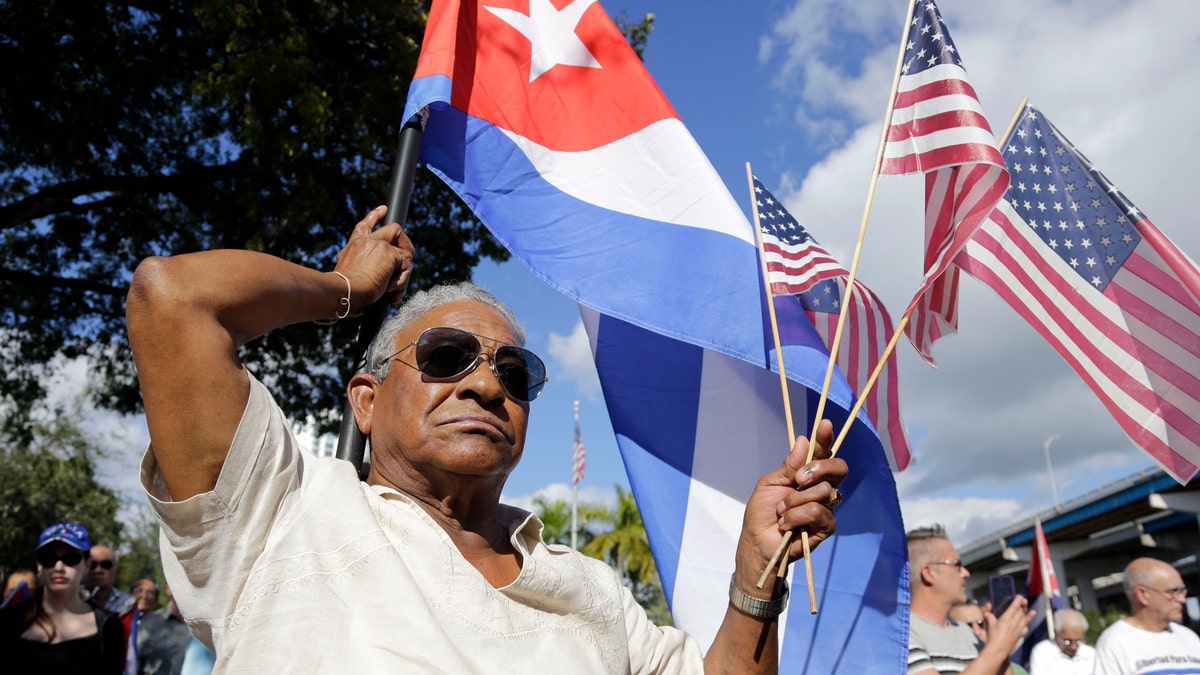
Dec. 20, 2014: Evilio Ordonez holds Cuban and American flags during a protest against President Barack Obama's plan to normalize relations with Cuba, in the Little Havana neighborhood of Miami. (AP)
I know that it is too soon yet to determine whether or not the White House will get the Cuba deal right, and not long ago I wrote in support of the Obama administration’s decision to begin the process of normalizing diplomatic relations with the island nation.
I thought that President Obama’s speech at the time had valid points, and that indeed it was high-time for the U.S. and Cuba to move on in their new set of responsible compromises. As a Cuban-American, it was also my hope that this new relationship between the two countries would ultimately lead to more freedom and more prosperity for the people of Cuba.
Over my holiday break, I spoke with several Cuban-Americans living in the Caribbean to listen to their thoughts on this deal. I would say that most of them, especially those older than 65, were disappointed in the quick and hasty decision Obama made. They felt that the president acted without taking into consideration all the fundamental problems that communist Cuba is currently facing. Many felt that Cuba’s issues, specifically with human rights and all of the people that have been jailed fighting for those rights, were swept under the rug in an effort to ensure the deal would go through.
I also found it curious that in the Dominican Republic, where I was visiting, many of the newspapers were commenting on how a functional Cuba with restored U.S. diplomatic relations will affect the national economies of other Caribbean nations. The editorials noted concern about the future of tourism and the sugar business, and the exports those islands rely on when it comes to American trade.
As I continue to witness the various parts of this transition play out, I can see there’s a lot of work yet to be done. There are many characters in this tragic play that is Cuba and America, with one of the lead roles starring the Castro brothers. I worry that President Obama, in a quest to have his name printed in the history books as the president that normalized diplomatic relations with Cuba, will fail to anchor the necessary pillars of democracy that Cuba needs.
If indeed President Obama demanded that 53 prisoners of Cuba be freed in order for this relationship to move forward, why the need for secrecy? Why not release the names? It would only stand the benefit the legitimacy of his cause. Instead, we are seeing more and more journalists rightfully asking for the full story to be told.
I also think that the president could easily be miscalculating the drop in support that he will experience from the Latino community in the U.S. if this lack of transparency persists, especially in dealing with the Castro brothers. The Latino community in this country, despite the fact that they come from multiple Hispanic cultures and regions, do have strong support for each other. That support stems from a long-shared history of struggles with human rights, individual freedom and totalitarian regimes.
In making this deal, I don’t believe the president accounted for the Latino community of this country supporting the Cuban-Americans if they begin criticizing Obama for failing to reach a fair deal in ensuring democracy for the Cuban people. He must prove his true intentions, and begin distancing himself from the perceived notion that the deal was to secure his place in the history books and to advance his progressive agenda.
